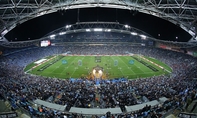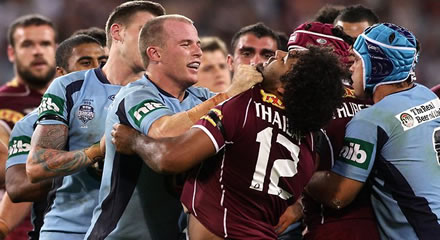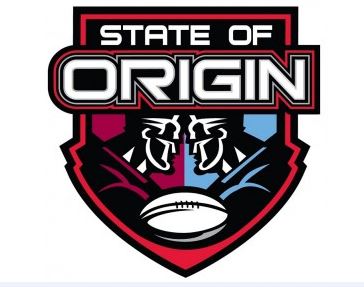- About Us
- Columns
- Letters
- Cartoons
- The Udder Limits
- Archives
- Ezy Reading Archive
- 2024 Cud Archives
- 2023 Cud Archives
- 2022 Cud Archives
- 2021 Cud Archives
- 2020 Cud Archives
- 2015-2019
- 2010-2014
- 2004-2009
 |
State of Origin, Booze and Brutality |
On the weekend of the winter solstice, two rugby codes in Australia competed with the AFL and the soccer World Cup for public attention. The one day cricket matches in England barely rated because Australia was seeking unsuccessfully to recover from the ball tampering scandal against South Africa which saw the suspension of its Captain, Vice-Captain and another batsman. The two rugby matches were the deciding test in a series of three between the Wallabies and the visiting Irish team (Saturday night) and the Sate of origin decider between New South Wales and Queensland (Sunday night).
Ireland won the rugby test narrowly, but the most interesting feature of the evening was the cultural contrast between supporters of the opposing teams. Very many Irish supporters were among the crowd and as usual, sang as well as cheering for their team. Occasionally, ‘The Fields of Athenry’ rang out around the ground and it must have given heart to the Irish players. It seems incredible that Australia’s response was to blast a pop song over the public address system. Apparently the rugby organisers have no faith in Australian supporters to muster ‘Waltzing Matilda’ or anything similar. At its worst, the resort to the PA system could be seen as a hard hearted attempt to drown out Irish cultural superiority. It best it was a futile attempt to make up for a deficiency in Australian culture. In any case, it was plain that Australia lost both the on-field and off-field prizes. 
A rather more serious deficiency was played out on the Sunday. Recent research based around statistics compiled by the New South Wales Bureau of Crime Statistics reveals that domestic violence, and indeed other assaults, increases dramatically on nights when Rugby League State of Origin games take place against Queensland. The spike in the statistics – some 40% - is too significant to be coincidental. See HERE.
Several factors could be relevant here. One is the association of the night with alcohol. The football code is heavily reliant on alcohol advertising and it is likely that high consumption of alcohol is implicated in incidents of domestic violence inflicted on women and children. If the connection is shown to be certain, then there will justifiably be calls for rugby league to abandon its alcohol sponsors. Such adjustments are achievable, as the rejection of tobacco advertising shows. It might well be that the federal government could encourage such an adjustment by increasing grants to rugby league on the condition that they move away from alcohol sponsors. Expenditure of this sort could be a direct way of preventing domestic violence.
The second possibility is that the very culture of rugby league encourages unbridled displays of machismo. There are numerous examples from Sate of origin and beyond. Several players have been charged with assault but reinstated by their clubs despite the code paying iip service to the idea that rugby league is a family game. In one unsavoury incident a captain of the ‘blues’ king hit a Queensland opponent but did not change his swaggering demeanour. When a captain is so ill disciplined it sets a bad example.
The third possibility is that media reporting and the presentation of the game encourage young drunken males to believe they can get away with anything. If there happens to be a melee or some ‘biff’ in the game, television news reports are sure to run such incidents time after time. This was certainly the case with the NSW captain’s assault on his opposing player. It is a rarity indeed for any player to press charges against an opponent, even though such assaults are blatant and unsporting. While such incidents might ‘stay on the field’ for players, they obviously spill out into society.
Other football codes might also have problems escaping their macho image. However the spike in general assaults in New South Wales on State of Origin nights suggests that the rugby league has built itself a dangerous and perhaps toxic event. It may well be a popular annual outing for the code, but these statistics have the potential to rapidly undermine support. As with all statistics in the area of domestic violence, under-reporting is the norm. A spike of 40% might well hide even more appalling numbers.
The causes of domestic violence are complex and might vary from case to case. What seems certain is that it is an exercise in the use of cruel, bullying power. Whether your team happens to win or lose the match may be irrelevant. Wives and children could be cringing, worrying about the possibility that their man’s team might lose, leaving him to vent his anger against those nearest and most vulnerable. Should his team win, then he might gain an attitude of entitlement and feel so superior that he wants to express this feeling physically. In either case, it is difficult to avoid the possibility that alcohol loosens the constraints under which such men might normally operate.
If we are serious about addressing domestic violence, then it is important that we do not ignore such objective evidence as provided by this research. Such a spike in the incidence of reported domestic violence cannot be merely coincidental correspondence. There is clearly a causal link here. Whether the solution is to break the link between the game and alcohol, or to change something culturally embedded is not clear. What is clear is that no-one should wish to see another State of Origin match proceed while we can expect a 40% increase in domestic violence to occur. It is a great pity that no political leaders had the courage to forego the opportunity to bask in the popularity of the event on Sunday night. There is great doubt about Australia’s commitment to ending domestic violence.
Dr Tony Smith is a former political science academic with interest is elections, parliament and political ethics. Other recent writings can be found at www.johnmenadue.com.
